

Poof! Your Job Is Now Freelance, Part-time, No Benefits. Photo Credit: IdeaStepConceptStock/Shutterstock.com August 21, 2013 | Like this article?
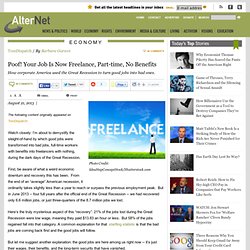
Join our email list: Stay up to date with the latest headlines via email. The following content originally appeared on TomDispatch: Watch closely: I’m about to demystify the sleight-of-hand by which good jobs were transformed into bad jobs, full-time workers with benefits into freelancers with nothing, during the dark days of the Great Recession.
First, be aware of what a weird economic downturn and recovery this has been. Here’s the truly mysterious aspect of this “recovery”: 21% of the jobs lost during the Great Recession were low wage, meaning they paid $13.83 an hour or less. But let me suggest another explanation: the good jobs are here among us right now -- it’s just their wages, their benefits, and the long-term security that have vanished. Freelance Nation Ina Bromberg genuinely likes to outfit people. Employee Happiness Matters More Than You Think. Pro: Bring on the Smiles, Count the Profits by Teresa Amabile and Steven Kramer, The Progress Principle Productivity measures across national economies have captivated the attention of policy makers and executives alike.
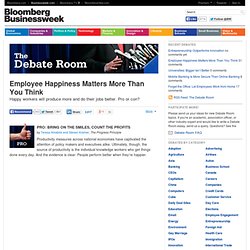
Ultimately, though, the source of productivity is the individual knowledge workers who get things done every day. And the evidence is clear: People perform better when they’re happier. Our research over the past decade has focused on creativity, productivity, and the psychology of everyday work life. Gallup quantified the link between employee feelings and corporate outcomes, reporting that lost productivity due to employee disengagement costs more than $300 billion in the U.S. annually. We can all think of creative geniuses tortured by depression (e.g., Vincent van Gogh, Virginia Woolf), and many managers still believe stress and fear are the best ways to keep workers cracking.
Con: Contentment Can Breed Complacency by Costas Markides, London Business School. Research Shows Happy Employees Are More Productive. Employee happiness is becoming a hot topic among CEOs and in boardrooms, notes Rob Markey in a Harvard Business Review blog post, “Transform Your Employees into Passionate Advocates.”
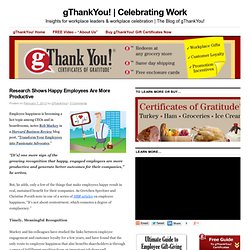
“[It’s] one more sign of the growing recognition that happy, engaged employees are more productive and generate better outcomes for their companies,” he writes. But, he adds, only a few of the things that make employees happy result in real, sustained benefit for their companies. As Gretchen Spreitzer and Christine Porath note in one of a series of HBR articles on employee happiness, “It’s not about contentment, which connotes a degree of complacency.”
Timely, Meaningful Recognition Markey and his colleagues have studied the links between employee engagement and customer loyalty for a few years, and have found that the only route to employee happiness that also benefits shareholders is through a sense of fulfillment resulting from an important job done well. Are Happy Employees More Productive: Statistics, Examples, and Trends. 1Google + 2The Happy Worker vs.
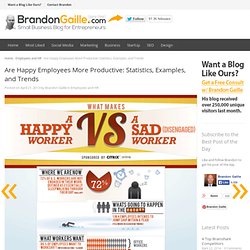
The Sad Worker Studies by Gallup have shown that currently 72 % of the U.S. workforce is not engaged in their job. This essentially means they are sleepwalking through the day and just counting down the hours before they can leave. This statistic doesn’t paint a good picture for the future. 1 out of every 4 employees has plans to leave their current job within just one year, according to a survey by Telework Research Network. So what can help address this growing problem of disengaged workers? How to keep your employees happy and productive. In light of today’s economic landscape, it’s more important than ever for companies to have happy and productive employees.
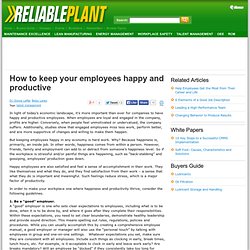
When employees are loyal and engaged in the company, profits are higher. Conversely, when people feel unmotivated or undervalued, the company suffers. Additionally, studies show that engaged employees miss less work, perform better, and are more supportive of changes and willing to make them happen. But keeping employees happy in any economy is hard work. Why? Happy employees are also satisfied and feel a sense of accomplishment in their work. In order to make your workplace one where happiness and productivity thrive, consider the following guidelines. 1. 2. As an employer, you have an excellent opportunity to make a difference in your employees’ lives. Canada's Top 100 Employers: National Competition. New Study: A Happy Workplace Really is Crucial. Why Happy Employees Determine Your Success - Articles - Executive Travel.
Happy?
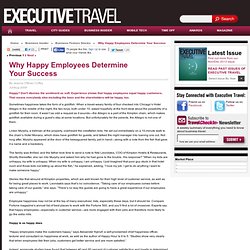
Don't dismiss the sentiment as soft. Experience shows that happy employees equal happy customers. That means everybody else-including the boss and the shareholders-will be happy, too. Sometimes happiness takes the form of a goldfish. When a travel-weary family of four checked into Chicago’s Hotel Allegro in the middle of the night, the two boys, both under 10, asked hopefully at the front desk about the possibility of a goldfish for their room.
Linton Murphy, a bellman at the property, overheard the crestfallen kids. The family was thrilled, and the father took time to send a note to Niki Leondakis, COO of Kimpton Hotels & Restaurants. Stories like that abound at Kimpton properties, which are well known for their high level of customer service, as well as for being great places to work. Search Results for Advanced Drainage Systems. Top 10 Companies Doing the Most to Make Their Employees Happier - In Photos: Top 10 Companies Doing the Most to Make Their Employees Happier.